When Francis Collins departed as Director of the National Institutes for Health (NIH) in December 2021, his legacy included multiple-millions of dollars in secret royalty payments to himself, prominent colleagues like Dr. Anthony Fauci, and hundreds of other scientists, officials, and researchers working under him.
Today, Collins is the highest paid adviser to the president with the most expensive White House staff ever, according to data compiled by the Chicago-based non-profit government watchdog, Open The Books (OTB).
Collins is paid $300,000 annually as the Acting Science Adviser to President Joe Biden. The new salary represents a 47 percent increase over the $203,500 annual compensation Collins made as NIH Director for 12 years. All salary figures were obtained by OTB under the Freedom of Information Act (FOIA) from the U.S. Office of Personnel Management (OPM).
Earlier this year, The Epoch Times first reported that OTB uncovered more than 1,600 NIH officials, scientists, and researchers who received an estimated $350 million in secret royalty payments from sources outside the government that the agency refuses to identify.
The payments were made between 2010 and 2020, including all but a couple of years of Collins’ tenure.
“We also find that during this period, leadership at NIH was involved in receiving third-party payments. For instance, Francis Collins, the immediate past director of NIH, received 14 payments. Dr. Anthony Fauci received 23 payments, and his deputy, Clifford Lane, received eight payments,” OTB President Adam Andrzejewski told The Epoch Times.
Collins’ successor as NIH Director, Dr. Lawrence Tabak, admitted to Congress in May that the secret royalty payments have “the appearance of a conflict of interest,” but he claimed the agency has sufficient internal safeguards to prevent abuse.
Federal personnel law and regulations bar government employees from having either actual conflicts of interest or the appearance of conflicts in their decision-making as public servants.
Read Full Article on TheEpochTimes.com









